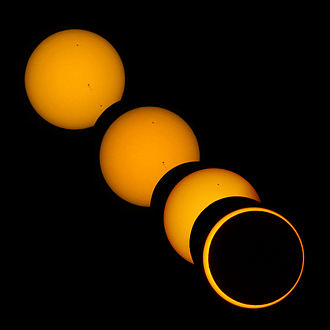Solar eclipse
Solar eclipse occurs when the Moon passes between the Sun and Earth, thereby totally or partly obscuring the image of the Sun for a viewer on Earth. A solar eclipse can only happen during a new moon, when the Moon's orbit crosses the ecliptic plane, the path within which the Sun appears to move from the perspective of the Earth. Depending on the geometry of the Sun, Moon, and Earth alignment, there are four types of solar eclipses: total, annular, hybrid (also known as annular-total eclipse), and partial.
Types of Solar Eclipses
Total Solar Eclipse
During a total solar eclipse, the Moon completely covers the Sun, as viewed from Earth. This can only occur when the Moon is near its perigee, the point in its orbit closest to the Earth, making the Moon appear large enough to cover the Sun entirely. The umbra, the Moon's shadow that completely obscures the Sun, casts a shadow on Earth's surface, creating a brief period of daytime darkness in the middle of the day over the areas experiencing totality.
Annular Solar Eclipse
An annular solar eclipse happens when the Moon is near its apogee, the farthest point from the Earth in its orbit. In this case, the Moon appears smaller than the Sun in the sky and does not completely cover the solar disk. Instead, a bright ring, or "annulus," of sunlight surrounds the Moon.
Hybrid Solar Eclipse
Hybrid eclipses are a rare phenomenon that shifts between a total and an annular eclipse along its path. At certain points on Earth, it appears as a total eclipse, while at other points, it appears as an annular eclipse. This type of eclipse occurs when the Moon's distance from Earth is near the threshold where it can appear to be the same size as the Sun.
Partial Solar Eclipse
A partial solar eclipse occurs when only a part of the Sun is obscured by the Moon. This can happen when the Sun, Moon, and Earth are not exactly aligned. The size of the obscured part of the Sun's disk varies depending on the location of the observer.
Observation and Safety
Observing a solar eclipse requires special precautions, as looking directly at the Sun can cause permanent eye damage or blindness. Special eclipse glasses or solar filters are recommended for viewing a solar eclipse. These filters must meet a worldwide standard known as ISO 12312-2 for safe viewing.
Scientific Importance
Solar eclipses offer unique opportunities for astronomers and scientists to study the Sun's corona, the outer atmosphere, which is usually obscured by the bright solar disk. During a total solar eclipse, the corona becomes visible, providing valuable data about solar activity, solar wind, and the physics of the Sun's outer layers.
Cultural Impact
Solar eclipses have had a significant impact on culture, religion, and mythology throughout history. Many ancient civilizations interpreted solar eclipses as omens or messages from the gods, often inspiring fear or awe. Today, solar eclipses continue to be major events for both scientific communities and the general public, drawing crowds to the paths of totality for the unique experience of totality.
Transform your life with W8MD's budget GLP-1 injections from $125.
W8MD offers a medical weight loss program to lose weight in Philadelphia. Our physician-supervised medical weight loss provides:
- Most insurances accepted or discounted self-pay rates. We will obtain insurance prior authorizations if needed.
- Generic GLP1 weight loss injections from $125 for the starting dose.
- Also offer prescription weight loss medications including Phentermine, Qsymia, Diethylpropion, Contrave etc.
NYC weight loss doctor appointments
Start your NYC weight loss journey today at our NYC medical weight loss and Philadelphia medical weight loss clinics.
- Call 718-946-5500 to lose weight in NYC or for medical weight loss in Philadelphia 215-676-2334.
- Tags:NYC medical weight loss, Philadelphia lose weight Zepbound NYC, Budget GLP1 weight loss injections, Wegovy Philadelphia, Wegovy NYC, Philadelphia medical weight loss, Brookly weight loss and Wegovy NYC
|
WikiMD's Wellness Encyclopedia |
| Let Food Be Thy Medicine Medicine Thy Food - Hippocrates |
Medical Disclaimer: WikiMD is not a substitute for professional medical advice. The information on WikiMD is provided as an information resource only, may be incorrect, outdated or misleading, and is not to be used or relied on for any diagnostic or treatment purposes. Please consult your health care provider before making any healthcare decisions or for guidance about a specific medical condition. WikiMD expressly disclaims responsibility, and shall have no liability, for any damages, loss, injury, or liability whatsoever suffered as a result of your reliance on the information contained in this site. By visiting this site you agree to the foregoing terms and conditions, which may from time to time be changed or supplemented by WikiMD. If you do not agree to the foregoing terms and conditions, you should not enter or use this site. See full disclaimer.
Credits:Most images are courtesy of Wikimedia commons, and templates, categories Wikipedia, licensed under CC BY SA or similar.
Contributors: Prab R. Tumpati, MD






